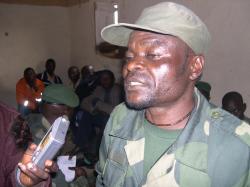Last week the Congolese army and the United Nations announced that they would launch joint military operations against the rebel group Front for Patriotic Resistance of Ituri (FRPI) in Orientale Province after its leader failed to honor a meeting with the army to discuss the group’s terms of surrender.
A local customary chief who had facilitated an earlier meeting called on all parties to give peace one last chance and meet up this Wednesday. The leader of FRPI Cobra Matata said he was ready for war (photo above).
The conflict in Orientale is worrisome but has largely been ignored in the press. The situation is particularly grave in southern Irumu territory, which the United Nations call the “new epicenter of displacement in Orientale Province.” (See for a map here).” The situation has worsened considerably since April this year with FRPI becoming increasingly aggressive. According to a MONUSCO official, the “protection of civilians is a catastrophe.”
While the threat of military force might be helpful if not necessary to pressure FRPI to surrender, MONUSCO must not repeat mistakes from the past. There are six main lessons MONUSCO must remember if the meeting on Wednesday were to fail and military operations to begin.
Same old same old?
The last time the army seriously fought FRPI was in fall last year. The operations were very badly conducted and aggravated an already dire humanitarian situation, causing the displacement of 150,000 just a month into the fighting. According to the UN Group of Experts, the Congolese army conducted the operations “with insufficient logistical support, which limited progress on the battlefield and led to predatory behaviour by soldiers.”
First, MONUSCO must not forget that the army conducted these operations unilaterally, informing the mission of the forthcoming attack only one day in advance. Eventually, MONUSCO had no chance but to step in eventually to provide logistical and medical support and help clean up the mess. So, if joint operations were to begin, MONUSCO must make sure that it is not just fully involved but puts in place robust measures to mitigate humanitarian fallout that is certain to ensue any operation.
Second, FRPI has been around for now twelve years and has withstood many military operations. While the operations last year “severely weakened” the rebel group according to the Group of Experts, MONUSCO should have a clear idea of what new operations would actually yield in the grand scheme of things. Will MONUSCO pursue a new military strategy or just conduct it as usual and hope for the best?
The map below by Christoph Vogel shows FRPI’s approximate position as of June 2014.
Third, FRPI is trained in guerilla war and has got its bearings in very remote areas. That said, if you really want to neutralize them, you should be able to do it. But MONUSCO should ask itself: do the actors involved actually want to do that once and for all?
Fourth, MONUSCO must not forget that the General it would cooperate with is General Fall Sikabwe (photo below, on the right). In April this year, Sikabwe was mandated to discuss the surrender of another rebel leader – Paul Sadala of Mai Mai Morgan – but mishandled the process, which led to the death of Sadala. His death is a serious discouragement not just for Cobra Matata but all other rebel groups in the area. In addition, the General had misinformed the UN Group of Experts last year, asserting that MONUSCO had actually been involved in the planning of the operation against FRPI.
Fifth, MONUSCO must bear in mind the circumstances under which Cobra Matata is contemplating his possible surrender. Not only might he be afraid that he faces the same fate as Paul Sadala, he will certainly remember what has happened to his fellow comrades. His predecessors Germain Katanga and Mathieu Ngudjolo Chui but also his arch-enemies Thomas Lubanga and Bosco Ntaganda of the UPC rebel group have stood or currently stand trial at the International Criminal Court. Bearing that in mind does not mean, however, that authorities should grant Matata amnesty in order lure him out the bush. On the contrary.
Sixth, MONUSCO should use its clout over the army to ensure that the meeting on Wednesday will take place.
A suivre.
Further resources
- For the latest information on FRPI, see the report of the UN Group of Experts: S/2014/42, paras. 58-63, 139, 141, 165, annex 30.
- To learn about FNI/FRPI and UPC, I can highly recommend the Usalama Project reports written by Hennig Tamm of Oxford University. Make sure to follow him on Twitter (@hetamm).
- To get a deeper historical background on issues of ethnicity and exploitation of natural resources in Congo’s north east, take a look at Usalama’s report on Ituri written by Dan Fahey.
- To learn more about the 1999-2006 Ituri war which pitted the FNI/FRPI against the UPC (among others), I suggest reports by Human Rights Watch (here, here, and here), International Crisis Group (here and here), the UN Secretary-General and the resolutions from the United Nations Security Council.
- For accounts of human rights violations committed by FRPI, see amongst others reports by the US Department of State (2011, 2010, 2009, 2008, 2007, 2004).
Photo credits: Brazilian Post, MONUSCO, RFI, and International Criminal Court.










The XO SEVEN has premium finishes, including a padded headband
and noise isolating on-ear cups with reminiscence foam cushions.
Posted by turtle beach ear force xlc | June 16, 2015, 11:33 amPiece of writing writing is also a excitement, if you
be familiar with afterward you can write or else it is difficult to write.
Posted by dj pour mariage seine et marne | December 21, 2015, 6:55 pm